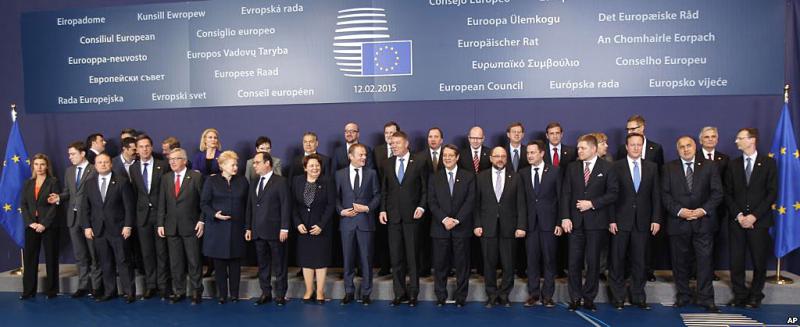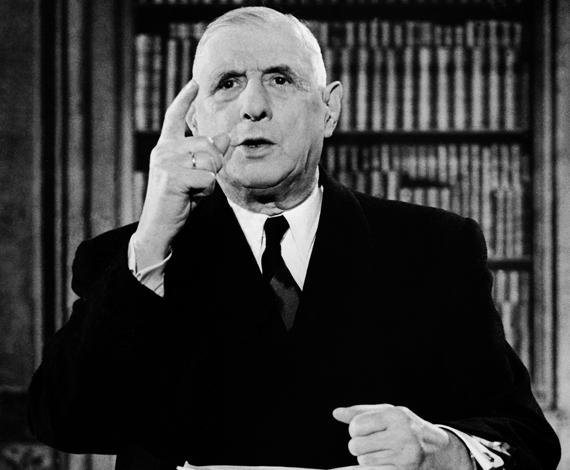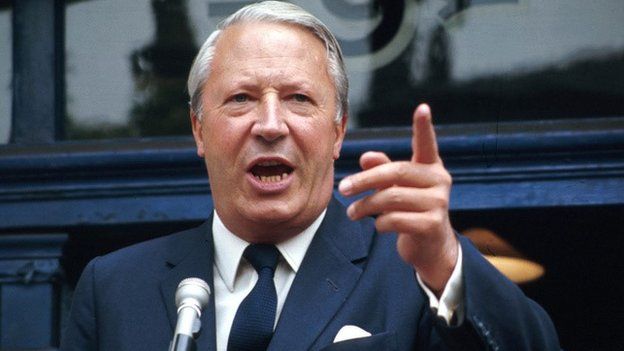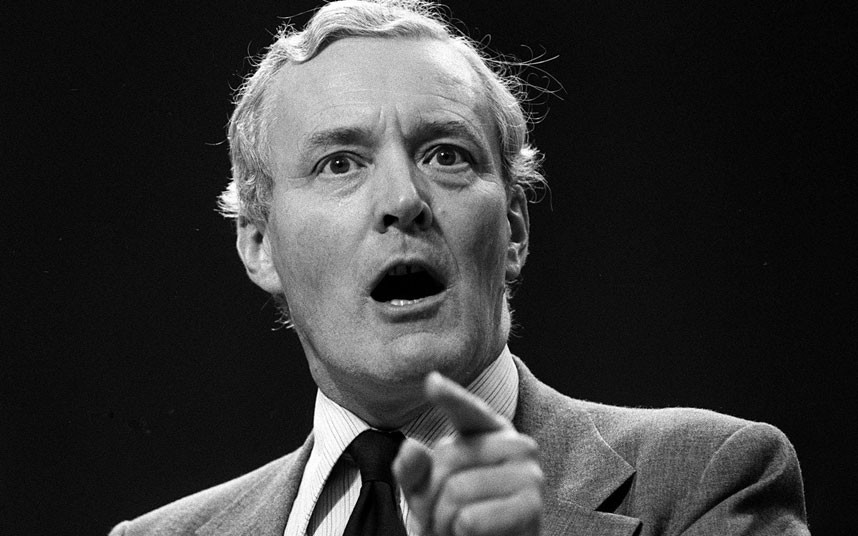Europe: Them or Us, BBC Two | reviews, news & interviews
Europe: Them or Us, BBC Two
Europe: Them or Us, BBC Two
Nick Robinson tiptoes cautiously through the minefield of Britain's relations with Europe

The BBC opened its examination of the history of European togetherness with presenter Nick Robinson beaming at us from the top of those White Cliffs, looking out at the glistening sea which made us an island (until, of course, Mrs Thatcher supported the Channel Tunnel).
This inconclusive history of Britain in and out of Europe began at the very end of the Second World War, when the eloquent proposer of a united Europe which definitely included West Germany was Sir Winston Churchill. This first episode of two, subtitled "An Island Apart", set the scene with two ex-politicians, Hague and Blair, commenting how different Britain is from Europe, while surprising vintage film showed the great wartime leader visiting Amsterdam post-war where he was serenaded by thousands singing a new song, "Europe United". We were also reminded that in 1940, just before France was invaded, Churchill’s war cabinet backed the audacious proposal to unite France and Britain in terms of both defence and economy, although foundering on the notion of a single currency. ("Non!" Charles de Gaulle, pictured below).
 It started with an ideal; by uniting across the continent there would be no more war. Robinson led us through the various landmarks: the 1951 European Steel and Coal Community of West Germany and France, ECSC, later joined by Benelux (remember Benelux?) and Italy, the small print hinting at a federal Europe to come. Clips with the grand old men, no longer with us, reminiscing on the events of 1950 and onward included knights galore, diplomats and politicians, from Douglas Jay to Frank Roberts and Roger Makins. At a crucial cabinet meeting senior members were away, and Britain was given an ultimatum to ratify or not; with no decision, the ultimatum passed. The rules of the European club to be were made by the founder members.
It started with an ideal; by uniting across the continent there would be no more war. Robinson led us through the various landmarks: the 1951 European Steel and Coal Community of West Germany and France, ECSC, later joined by Benelux (remember Benelux?) and Italy, the small print hinting at a federal Europe to come. Clips with the grand old men, no longer with us, reminiscing on the events of 1950 and onward included knights galore, diplomats and politicians, from Douglas Jay to Frank Roberts and Roger Makins. At a crucial cabinet meeting senior members were away, and Britain was given an ultimatum to ratify or not; with no decision, the ultimatum passed. The rules of the European club to be were made by the founder members.
March 1957 brought the Treaty of Rome, and the European Economic Community, with the original six nations, with Britain still not playing. Helmut Schmidt abstained from voting on the treaty, as he was distressed that Britain was not part of the deal. The British Prime Minister, Harold Macmillan, was hostile: he felt that Western Europe, dominated by West Germany, gave the Germans on a plate everything that Britain had fought two world wars to prevent. The continent, we were told, yearned for British leadership, but Britain was still outside. And Macmillan did a U-turn, perhaps on the basis of "if you can’t beat them, join them". Enter Edward Heath, the master of detail, negotiating for months in Brussels ("Oui!" Ted Heath, pictured below).
 The road to union remained treacherous and surprising in its twists and turns. We witnessed the Labour leader Hugh Gaitskell leading the charge that Britain was just not part of Europe; Europe’s borders were at the Rhine, Britain reached to the Himalayas, and we would be abandoning 1,000 years of history to cosy up to the continent. Roy Jenkins, in a marvellous smoothy-chops clip, described how even over lunch at the Garrick Club he could not persuade Gaitskell to change his mind.
The road to union remained treacherous and surprising in its twists and turns. We witnessed the Labour leader Hugh Gaitskell leading the charge that Britain was just not part of Europe; Europe’s borders were at the Rhine, Britain reached to the Himalayas, and we would be abandoning 1,000 years of history to cosy up to the continent. Roy Jenkins, in a marvellous smoothy-chops clip, described how even over lunch at the Garrick Club he could not persuade Gaitskell to change his mind.
January 1963, and cue the huge press conference in Paris, with 800 journalists, when de Gaulle clearly said "Non" to his erstwhile close colleague Harold Macmillan, spelling out in his terms that Britain was maritime and insular. Macmillan was distressed to the point of tears. France had effectively blackballed Britain, which evidently made Britain desperate to join the club that had so unexpectedly closed its door.
Heath it was who refuted every point the French made, and it was Pompidou and Heath who finally brought about the rapprochement, literally fuelled by gastronomic diplomacy. The great lunch in Paris took place at the British embassy under the skilled supervision of the British ambassador, Christopher Soames, not only Churchill’s son-in-law but a cheerful and clever bon viveur. One French politician indicated that doing business with the Americans would be impossible because of the lack of American culinary skill, but this luncheon did the trick. Meanwhile British fishermen protested by going up river to show that they were being sold down the river.
 Heath was accused of betraying Britain and we were shown the extraordinary secret machinations, masterminded by Francis Pym, and recorded by a backbench MP in a big red book, by which Labour pro-Europeans supported the Tory government (which had only a small majority) to vote in favour of Europe. Enoch Powell demonstrated in measured speech his fury in his classical rhetorical style; the anti-European Tony Benn (pictured above) said, in a spasm of barely controlled anger, that the vote for Europe in Parliament was in fact a coup d'état.
Heath was accused of betraying Britain and we were shown the extraordinary secret machinations, masterminded by Francis Pym, and recorded by a backbench MP in a big red book, by which Labour pro-Europeans supported the Tory government (which had only a small majority) to vote in favour of Europe. Enoch Powell demonstrated in measured speech his fury in his classical rhetorical style; the anti-European Tony Benn (pictured above) said, in a spasm of barely controlled anger, that the vote for Europe in Parliament was in fact a coup d'état.
There was a neat caricature of Harold Wilson sitting on the fence, but Episode One ended in 1975 with a referendum under Labour, and Britain no longer out but in. Heath turned out to be a master: the act before Parliament was a mere dozen clauses, and was whipped through, when the anti-Europeans had expected a thousand at least, and therefore years of delaying debate.
The music was properly portentous. The producer John Bridcut was also responsible for the 1996 BBC programmes on the EU, entitled The Poisoned Chalice – there's BBC impartiality for you – whence many of the interviews with those who have now passed on were taken. Next week’s episode is subtitled "Voice of the People".
The future of Arts Journalism
You can stop theartsdesk.com closing!
We urgently need financing to survive. Our fundraising drive has thus far raised £49,000 but we need to reach £100,000 or we will be forced to close. Please contribute here: https://gofund.me/c3f6033d
And if you can forward this information to anyone who might assist, we’d be grateful.

Subscribe to theartsdesk.com
Thank you for continuing to read our work on theartsdesk.com. For unlimited access to every article in its entirety, including our archive of more than 15,000 pieces, we're asking for £5 per month or £40 per year. We feel it's a very good deal, and hope you do too.
To take a subscription now simply click here.
And if you're looking for that extra gift for a friend or family member, why not treat them to a theartsdesk.com gift subscription?
more TV
 Down Cemetery Road, Apple TV review - wit, grit and a twisty plot, plus Emma Thompson on top form
Mick Herron's female private investigator gets a stellar adaptation
Down Cemetery Road, Apple TV review - wit, grit and a twisty plot, plus Emma Thompson on top form
Mick Herron's female private investigator gets a stellar adaptation
 theartsdesk Q&A: director Stefano Sollima on the relevance of true crime story 'The Monster of Florence'
The director of hit TV series 'Gomorrah' examines another dark dimension of Italian culture
theartsdesk Q&A: director Stefano Sollima on the relevance of true crime story 'The Monster of Florence'
The director of hit TV series 'Gomorrah' examines another dark dimension of Italian culture
 The Monster of Florence, Netflix review - dramatisation of notorious Italian serial killer mystery
Director Stefano Sollima's four-parter makes gruelling viewing
The Monster of Florence, Netflix review - dramatisation of notorious Italian serial killer mystery
Director Stefano Sollima's four-parter makes gruelling viewing
 The Diplomat, Season 3, Netflix review - Ambassador Kate Wyler becomes America's Second Lady
Soapy transatlantic political drama keeps the Special Relationship alive
The Diplomat, Season 3, Netflix review - Ambassador Kate Wyler becomes America's Second Lady
Soapy transatlantic political drama keeps the Special Relationship alive
 The Perfect Neighbor, Netflix review - Florida found-footage documentary is a harrowing watch
Sundance winner chronicles a death that should have been prevented
The Perfect Neighbor, Netflix review - Florida found-footage documentary is a harrowing watch
Sundance winner chronicles a death that should have been prevented
 Murder Before Evensong, Acorn TV review - death comes to the picturesque village of Champton
The Rev Richard Coles's sleuthing cleric hits the screen
Murder Before Evensong, Acorn TV review - death comes to the picturesque village of Champton
The Rev Richard Coles's sleuthing cleric hits the screen
 Black Rabbit, Netflix review - grime and punishment in New York City
Jude Law and Jason Bateman tread the thin line between love and hate
Black Rabbit, Netflix review - grime and punishment in New York City
Jude Law and Jason Bateman tread the thin line between love and hate
 The Hack, ITV review - plodding anatomy of twin UK scandals
Jack Thorne's skill can't disguise the bagginess of his double-headed material
The Hack, ITV review - plodding anatomy of twin UK scandals
Jack Thorne's skill can't disguise the bagginess of his double-headed material
 Slow Horses, Series 5, Apple TV+ review - terror, trauma and impeccable comic timing
Jackson Lamb's band of MI5 misfits continues to fascinate and amuse
Slow Horses, Series 5, Apple TV+ review - terror, trauma and impeccable comic timing
Jackson Lamb's band of MI5 misfits continues to fascinate and amuse
 Coldwater, ITV1 review - horror and black comedy in the Highlands
Superb cast lights up David Ireland's cunning thriller
Coldwater, ITV1 review - horror and black comedy in the Highlands
Superb cast lights up David Ireland's cunning thriller
 Blu-ray: The Sweeney - Series One
Influential and entertaining 1970s police drama, handsomely restored
Blu-ray: The Sweeney - Series One
Influential and entertaining 1970s police drama, handsomely restored
 I Fought the Law, ITVX review - how an 800-year-old law was challenged and changed
Sheridan Smith's raw performance dominates ITV's new docudrama about injustice
I Fought the Law, ITVX review - how an 800-year-old law was challenged and changed
Sheridan Smith's raw performance dominates ITV's new docudrama about injustice

Add comment